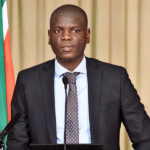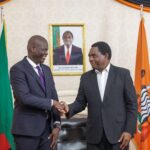Bishop Joe Imakando is a prominent religious leader in Zambia, best known for founding the Bread of Life Church International. His ministry has significantly impacted the spiritual landscape of Zambia and beyond. Here are 20 important things to know about Bishop Imakando:
- Early Life: Bishop Joe Imakando was born in Zambia and raised in a Christian family, which instilled in him a strong faith and a desire to serve God from a young age.
- Educational Background: He pursued theological studies at various institutions, equipping himself with the knowledge and skills necessary for effective church leadership and pastoral care.
- Founding of Bread of Life Church: In 1994, Imakando founded the Bread of Life Church International, which has grown to become one of the largest and most influential churches in Zambia.
- Global Reach: Under his leadership, the Bread of Life Church has expanded beyond Zambia, establishing branches in several countries across Africa and the world.
- Visionary Leadership: Bishop Imakando is known for his visionary leadership style, emphasizing the importance of prayer, faith, and community engagement in church growth and development.
- Preaching Style: His preaching is characterized by a passionate delivery and a focus on practical applications of biblical teachings, making his messages relatable and impactful.
- Community Development Initiatives: He has spearheaded numerous community development projects, including initiatives focused on education, health care, and poverty alleviation.
- Youth Empowerment: Bishop Imakando places a strong emphasis on youth ministry, encouraging young people to get involved in church activities and community service.
- Media Presence: He has utilized various media platforms, including television and radio, to broadcast his sermons and teachings, reaching a wider audience beyond the church congregation.
- Author: Bishop Imakando is an accomplished author, having written several books on faith, leadership, and spiritual growth, which have inspired many readers.
- Interfaith Dialogue: He believes in the importance of interfaith dialogue and works towards fostering understanding and cooperation among different religious groups.
- Mentorship: Bishop Imakando is a mentor to many emerging church leaders, providing guidance and support to help them fulfill their calling in ministry.
- Global Conferences: He frequently organizes and participates in international conferences and seminars, sharing his insights on leadership, spirituality, and community development.
- Recognition and Awards: Throughout his ministry, he has received numerous awards and accolades for his contributions to society, particularly in the areas of education and social justice.
- Family Life: Bishop Imakando is married and has children, and he often speaks about the importance of family and strong relationships in his sermons.
- Commitment to Prayer: He emphasizes the power of prayer in personal and communal life, leading prayer sessions and encouraging his congregation to maintain a vibrant prayer life.
- Philanthropy: Bishop Imakando is involved in various charitable initiatives, including support for orphaned and vulnerable children, and initiatives aimed at improving healthcare access.
- Resilience: Throughout his ministry, he has faced challenges, including opposition and personal loss, but his resilience has been a source of inspiration to many.
- Social Justice Advocacy: He is an advocate for social justice, using his platform to address issues such as poverty, inequality, and human rights, both locally and globally.
- Legacy: Bishop Joe Imakando’s legacy is one of faith, service, and community transformation. His impact on the church and society continues to inspire future generations to pursue their calling and contribute positively to their communities.
Bishop Joe Imakando’s life and ministry exemplify dedication to God and a commitment to uplifting others through faith and service. His influence extends beyond the church, making him a key figure in the spiritual and social landscape of Zambia and beyond.






